|
 Collopus epipterygius Collopus epipterygius
SynonymsMycena epipterygia
Agaricus epipterygius
BiostatusPresent in region - Indigenous. Non endemic
Images (click to enlarge)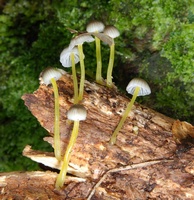
Owner: J.A. Cooper | 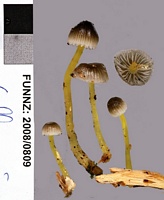
Owner: J.A. Cooper | 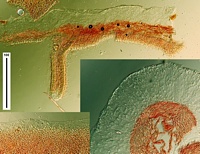
Caption: top: section through cap. lower right: section through stem. lower left: gill edge. All showing strong gelatinisation in melzers.
Owner: J.A. Cooper | 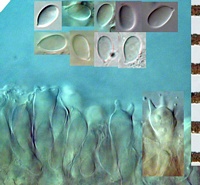
Caption: basidia and spores
Owner: J.A. Cooper | 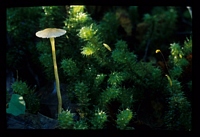
Owner: G.L. Barron | 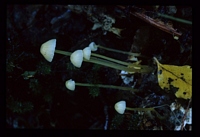
Owner: G.L. Barron | 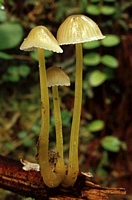
Caption: Mycena epipterygia
Owner: Kaimai Bush | 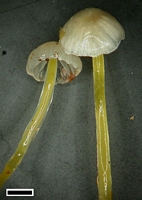
Caption: FUNNZ photo. scale=2mm
Owner: J.A. Cooper | 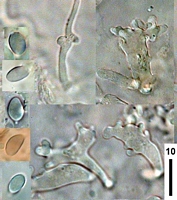
Caption: spores, cortical clamped hyphae and diverticulate terminal elements
Owner: J.A. Cooper | 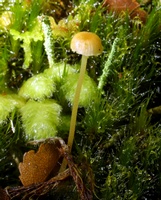
Owner: P. Leonard |
Article: Massee, G.E. (1899) [1898]. The fungus flora of New Zealand. Transactions and Proceedings of the New Zealand Institute 31: 282–349 Wellington:.
Description: Pileus membranaceous, campanulate, obtuse, becoming more or less expanded, never truly
depressed, striate, covered with a pellicle that is very viscid in wet weather and easily
separable in every atmospheric condition, colour variable, usually grey, or often pale
yellowish-green near the margin, which is often minutely notched when young, 1-2.5 cm.
across; gills adnate, with a decurrent tooth, thin, whitish or with a tinge of grey; spores
elliptical, 8-10 x 4-5 µ; stem 5-10 cm. long, about 2 mm. thick, hollow, tough, often wavy,
base rooting and fibrillose, even, viscid, usually yellowish but sometimes grey, pallid, or
whitish.
Habitat: On branches, twigs, among moss, &c.
Distribution: New Zealand. Europe, Siberia, United States.
Notes: Solitary or clustered. Colour variable, but readily known by the viscid pileus, and stem, both
being furnished with a slimy separable pellicle.
Article: Horak, E. (1971). A contribution towards the revision of the Agaricales (Fungi) from New Zealand. New Zealand Journal of Botany 9(3): 403-462 (http://www.rsnz.org/publish/abstracts.php).
Notes: Several species belonging to the genus Collopus are represented in New Zealand,
all of them closely related to the extremely variable C. epipterygius. Examined
material: KIRK 20, BERGGREN 18; COLENso b 847.
|